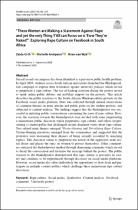“These women are making a statement against rape and yet the only thing y’all can focus on is ‘eww they’re naked’”: Exploring rape culture on Facebook in South Africa
Abstract
Sexual assault on campuses has been identifed as a pervasive public health problem.
In April 2016, students across South African universities launched the #Endrapeculture campaign to express their frustration against university policies which served
to perpetuate a rape culture. The use of hashtag activism during the protest served
to spark online public debates and mobilize support for the protests. This article
describes the public reactions to the South African #Endrapeculture protests on the
Facebook social media platform. Data was collected through natural observations
of comment threads on news articles and public posts on the student protests, and
subjected to content analysis. The fndings suggest that the #nakedprotest was successful in initiating public conversations concerning the issue of rape culture. However, the reactions towards the #nakedprotest were divided with some perpetuating
a mainstream public discourse which perpetuates rape culture, and others (re)presenting a counter-public that challenged current dominant views about rape culture.
Two related main themes emerged: Victim-blaming and Trivialising Rape Culture.
Victim-blaming narratives emerged from the commenters and suggested that the
protesters were increasing their chances of being sexually assaulted by marching
topless.

